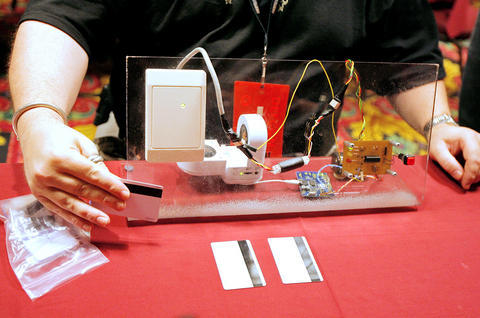Hackers gathered in Las Vegas on Saturday showed ways to crack electronic key-card systems and deadbolt locks used at security-sensitive places including the White House and the Pentagon.
"If you can't physically protect your computer, you are screwed," said Zac Franken, a British hacker who engineered a way to outwit door locks relying on key cards.
"Most people think that computers inside buildings are secure. How many computers do you see left logged on at night?" he said.

PHOTO: AP
Franken's creation was among the real-world lock-cracking revelations made at the DefCon hackers conference, where a room is devoted to the "sport" of lock picking.
Medeco deadbolt locks relied on worldwide at embassies, banks and other tempting targets for thieves, spies or terrorists can be opened in seconds with a strip of metal and a thin screw driver, Marc Tobias of Security.org demonstrated.
"This is incredible; it's unreal," Tobias said while showing the ease with which the locks can breached.
"Medeco has one of the best designed locks in the world, but with this kind of attack it's all irrelevant," he said.
US-based Medeco is owned by ASSA ABLOY Group, a Swedish manufacturer and supplier of locks.
"This is not the only company," Tobias said. "There are lot of them; lots of deadbolts with similar weakness."
Tobias said he refuses to publish details of "defeating" the locks because they are used in places ranging from homes and banks to the White House and the Pentagon.
"This can cause a lot of trouble," he said. "They need to fix this. If you have one of these on your house or wherever you'd better be concerned."
Franken is equally protective of the simple electronics he uses in a device that can be spliced into wires connecting key card readers to computer systems that control door locks on many businesses.
"The access control system is inherently insecure," Franken said. "I just walk up, pop off a cover held on by two screws, put my device in and we're away."
Easy targets for the "physical hack," involving manipulating hardware instead of computer software, are electronic key scanner pads at doors where workers step outside for cigarette breaks, Franken said.
Once the device is spliced into place, encoded cards can be used to command it to replay the last valid entry code or have the system deny access to people with legitimate cards, he showed.
"Basically, I can now lock all the valid users out while I can still get in," Franken said. "There is no patch for this."
Tobias wants to see a "Hogwarts School for Reality," which like the school of magic made famous in the Harry Potter novels would aim to inspire children to act creatively -- in this case by applying technology to security needs on and offline.
"It's no difference breaking into a lock or a computer," he said. "If you can get past locks you get to the computers. This is the real world; we need the real world Hogwarts."

Japanese Prime Minister Sanae Takaichi yesterday lavished US President Donald Trump with praise and vows of a “golden age” of ties on his visit to Tokyo, before inking a deal with Washington aimed at securing critical minerals. Takaichi — Japan’s first female prime minister — pulled out all the stops for Trump in her opening test on the international stage and even announced that she would nominate him for a Nobel Peace Prize, the White House said. Trump has become increasingly focused on the Nobel since his return to power in January and claims to have ended several conflicts around the world,

UKRAINE, NVIDIA: The US leader said the subject of Russia’s war had come up ‘very strongly,’ while Jenson Huang was hoping that the conversation was good Chinese President Xi Jinping (習近平) and US President Donald Trump had differing takes following their meeting in Busan, South Korea, yesterday. Xi said that the two sides should complete follow-up work as soon as possible to deliver tangible results that would provide “peace of mind” to China, the US and the rest of the world, while Trump hailed the “great success” of the talks. The two discussed trade, including a deal to reduce tariffs slapped on China for its role in the fentanyl trade, as well as cooperation in ending the war in Ukraine, among other issues, but they did not mention

REASSURANCE: The US said Taiwan’s interests would not be harmed during the talk and that it remains steadfast in its support for the nation, the foreign minister said US President Donald Trump on Friday said he would bring up Taiwan with Chinese President Xi Jinping (習近平) during a meeting on the sidelines of the APEC Summit in South Korea this week. “I will be talking about Taiwan [with Xi],” Trump told reporters before he departed for his trip to Asia, adding that he had “a lot of respect for Taiwan.” “We have a lot to talk about with President Xi, and he has a lot to talk about with us. I think we’ll have a good meeting,” Trump said. Taiwan has long been a contentious issue between the US and China.

GLOBAL PROJECT: Underseas cables ‘are the nervous system of democratic connectivity,’ which is under stress, Member of the European Parliament Rihards Kols said The government yesterday launched an initiative to promote global cooperation on improved security of undersea cables, following reported disruptions of such cables near Taiwan and around the world. The Management Initiative on International Undersea Cables aims to “bring together stakeholders, align standards, promote best practices and turn shared concerns into beneficial cooperation,” Minister of Foreign Affairs Lin Chia-lung (林佳龍) said at a seminar in Taipei. The project would be known as “RISK,” an acronym for risk mitigation, information sharing, systemic reform and knowledge building, he said at the seminar, titled “Taiwan-Europe Subsea Cable Security Cooperation Forum.” Taiwan sits at a vital junction on